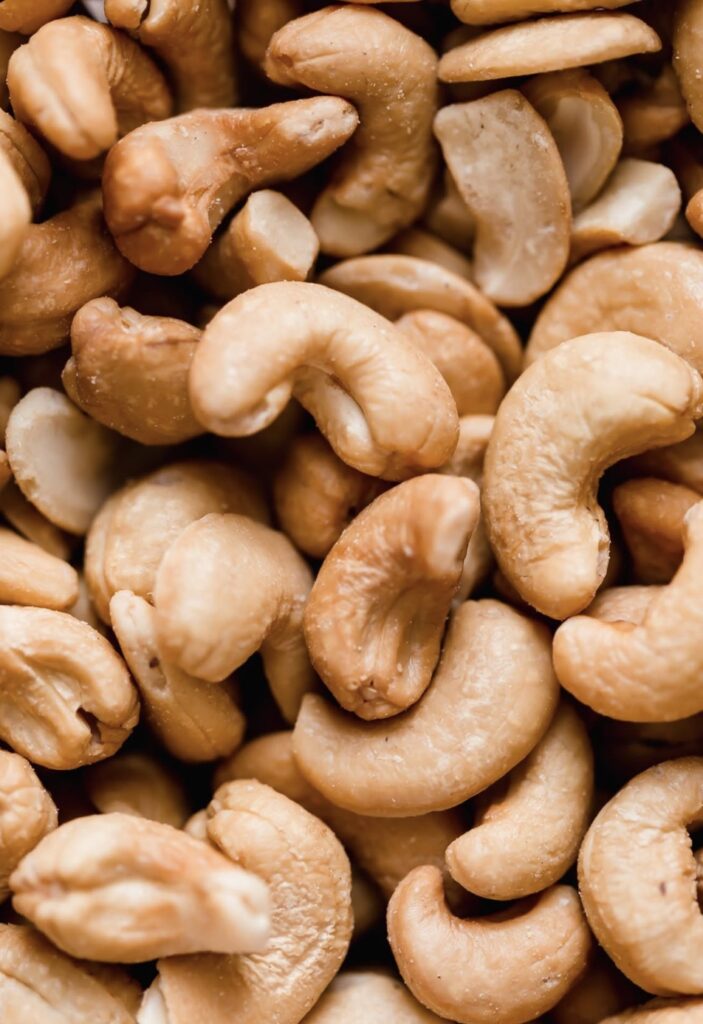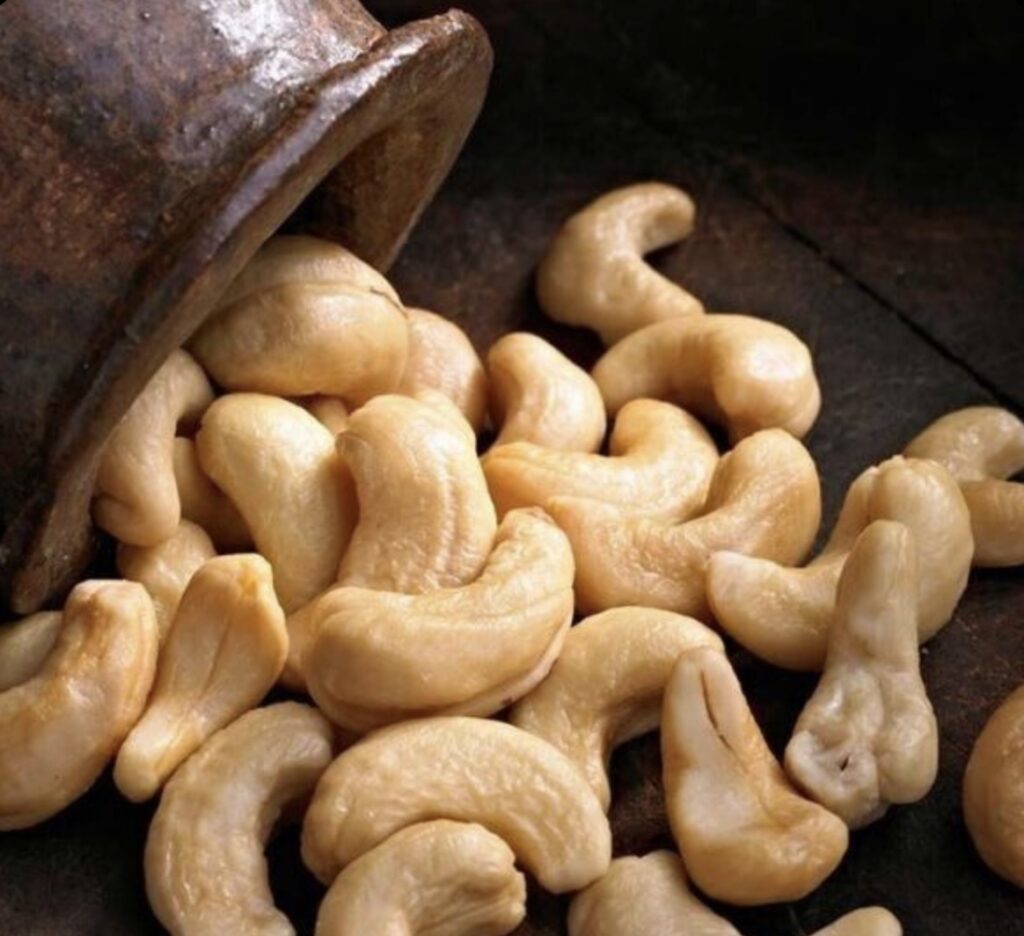Though often perceived as calorie-dense, cashew nuts are packed with protein and healthy fats, much like almonds, pistachios, and hazelnuts. Their versatility makes them a star ingredient in both savory and sweet dishes—and a popular snack, whether eaten raw or roasted. Despite their creamy flavor, cashews contain no cholesterol and deliver an impressive array of nutrients, including thiamine, niacin, and vitamin E.

What Are Cashews, Really?
Technically, cashews are not nuts but the seeds of a tropical evergreen fruit native to South America. These little seeds pack a serious nutritional punch, being rich in essential minerals such as iron, magnesium, potassium, and zinc. They also contain polyphenols and carotenoids, powerful antioxidants that reduce inflammation and protect cells from damage caused by free radicals.
The healthy Omega-6 fatty acids found in cashews provide additional benefits, promoting skin, hair, bone health, and supporting metabolism. Thanks to their fiber content, cashews aid in digestion and help maintain gut health, which may even reduce the number of calories absorbed by the body. In fact, some studies suggest that only 84% of the calories in cashews are absorbed—making them a healthier snack option than processed foods.
Health Benefits and Risks: The Importance of Moderation
Despite their many benefits, cashews need to be consumed in moderation. A 100-gram serving contains nearly 600 calories, so it’s easy to overindulge. Health experts recommend a portion size of one ounce (around 18 cashews) per day—about 157 calories—to enjoy their benefits without going overboard.
It’s also important to consider that cashews contain oxalates, compounds that can promote kidney stone formation when consumed in excess. For those with a history of kidney or gallbladder issues, it’s wise to limit cashew intake to avoid potential health problems.
How to Incorporate Cashews into Your Diet
Cashews are incredibly versatile and fit seamlessly into various dishes. Here are a few ways to enjoy them:
- Snacks: Enjoy a small handful of roasted or raw cashews between meals.
- Salads: Add them to green salads or quinoa bowls for extra crunch and flavor.
- Breakfast: Sprinkle them over yogurt with fresh fruit and honey for a nutritious start to your day.
- Savory Dishes: Toss them into stir-fries or curries for a buttery, nutty flavor.
- Plant-Based Alternatives: Use cashews to create dairy-free milks, butters, or vegan cheeses.

Thai-Inspired Cashew Chicken Recipe
One of the most popular uses for cashews is in Asian cuisine, where they enhance the flavors of stir-fries and curries. Here’s a simple Thai-inspired cashew chicken recipe to try at home:
Ingredients
- ½ cup cashews
- 14 oz chicken breast, cut into bite-sized pieces
- Black pepper
- ½ cup flour or cornstarch
- 1 small onion, sliced
- 1 red bell pepper, sliced
- 3-6 spring onions, sliced
- 3 garlic cloves, minced
- 3-5 dried red chilies, chopped
- Avocado oil for frying
Sauce Ingredients
- 2 tbsp soy sauce
- 2 tbsp fish sauce
- 2 tbsp sugar
- 1 tbsp sesame oil
Instructions
- Season the chicken with black pepper, soy sauce, and coat with flour or cornstarch.
- Mix the sauce ingredients and set aside.
- Heat oil in a wok or pan and cook the chicken until golden brown. Remove and set aside.
- Toast the cashews in the same pan until lightly browned, then remove.
- Stir-fry the garlic, onion, bell pepper, spring onions, and chilies.
- Add the chicken, cashews, and sauce to the pan. Stir everything together for a few minutes.
- Serve with rice or noodles, garnished with cilantro or basil if desired.
A Nutrient-Packed Snack Worth Adding to Your Diet
Cashews strike a balance between indulgence and nutrition, making them an excellent snack when eaten in moderation. With their blend of healthy fats, essential minerals, and antioxidants, cashews are a versatile, nutrient-dense addition to your meals. Whether you enjoy them in plant-based products, stir-fries, or just as a quick snack, cashews offer far more than just calories—providing both flavor and health benefits in every bite.
EUROPEAN PERSPECTIVE
Cashew Nuts According to BBC
Cashews: Health Benefits and Risks
What Are Cashews?
Cashews are seeds from the cashew tree’s fruit, related to mangoes and poison ivy. Grown in warm climates like India and Vietnam, they have a sweet, nutty flavor and are enjoyed raw, roasted, or in dishes such as curries and stir-fries.
Health Benefits
- Heart Health: Cashews help lower cholesterol and protect arteries from blockages.
- Longevity: Diets rich in unsaturated fats reduce mortality risk.
- Antioxidants: Cashews contain polyphenols and carotenoids, reducing oxidative stress.
- Stroke Prevention: Magnesium in cashews helps lower stroke risk.
- Weight Control: Eating cashews supports healthy weight management and reduces obesity risk.
- Blood Sugar Regulation: Improves insulin sensitivity, aiding diabetes management.
Risks
- Allergies: Can trigger severe allergic reactions.
- Kidney Stones: High in oxalates, which may contribute to stone formation.
Conclusion
Cashews are nutrient-rich and versatile but should be eaten in moderation. Opt for unsalted, raw cashews to maximize health benefits and avoid unnecessary additives.
sources: https://www.vogue.com/article/cashew-nuts-benefits https://www.bbc.com/afrique/articles/czr2zx97rxzo



